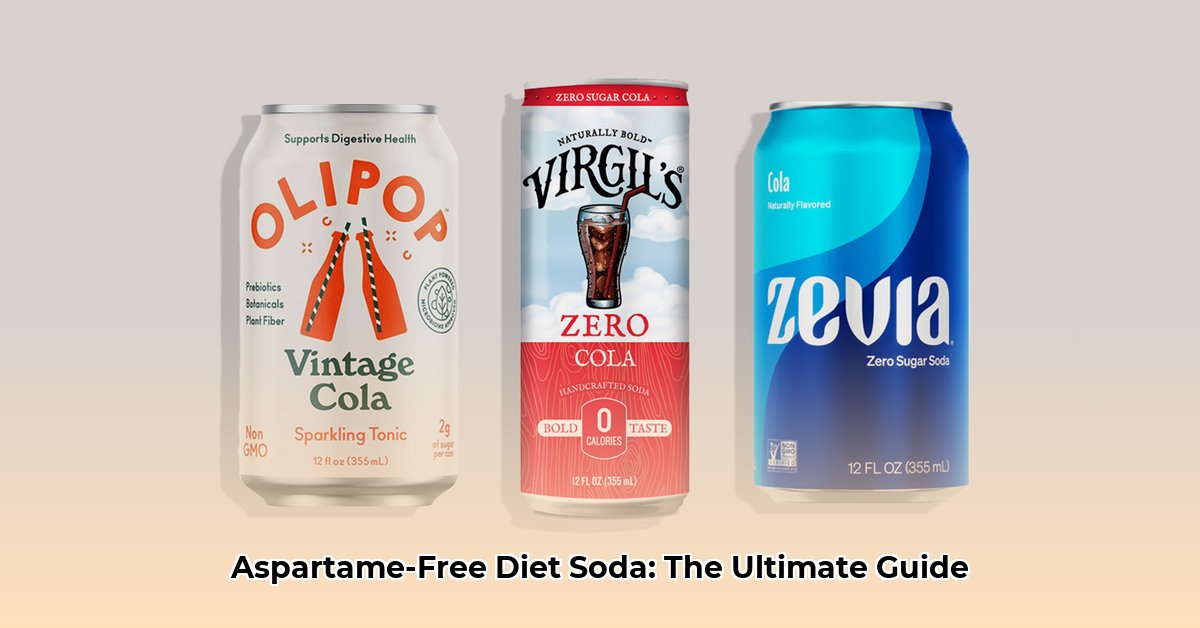“`markdown
Find the Best Diet Pop Without Aspartame: Expert Guide
Diet soda seems straightforward, but choosing one can be perplexing. Aspartame has faced scrutiny, pushing many to seek aspartame-free alternatives. But are these substitutes truly better? This guide clarifies the confusion, exploring various sugar substitutes and examining the scientific evidence (or lack thereof) regarding their health effects. It aims to empower you to make informed choices about your beverage consumption, whether you’re pursuing the ideal aspartame-free soda or simply seeking deeper knowledge about your drinks’ contents. We’ll equip you with the essentials, from grasping your options to adopting healthier habits for sustained wellness. For more information on aspartame-free options, check out this helpful resource.
Diet Pop Without Aspartame: Navigating the Sweetener Maze
Seeking a diet soda sans aspartame? Excellent move. Aspartame’s safety has been debated extensively, and the realm of artificial sweeteners is indeed intricate. It involves more than just avoiding a single ingredient. Let’s delve into it.
Understanding the Sweetener Swap: Aspartame Alternatives
Many aspartame-free diet sodas incorporate alternative artificial sweeteners like sucralose (Splenda), stevia, monk fruit, erythritol, and even blends of these. Regulatory bodies like the FDA generally deem these safe in moderation. However, critical long-term studies are somewhat lacking. While we have some knowledge, the comprehensive picture is evolving. It’s like assembling pieces of a puzzle, with the final image yet to be revealed. Does avoiding one potentially harmful ingredient, make a significant difference or outweigh other potentially unhealthy ingredients? Understanding the properties of each alternative is key:
- Sucralose (Splenda): An artificial sweetener approximately 600 times sweeter than sugar. It’s not metabolized, meaning it passes through the body without being broken down for energy.
- Stevia: A natural sweetener derived from the Stevia rebaudiana plant. It’s calorie-free and significantly sweeter than sugar.
- Monk Fruit: Another natural sweetener extracted from the monk fruit. It contains no calories and is about 100–250 times sweeter than sugar.
- Erythritol: A sugar alcohol that occurs naturally in some fruits and fermented foods. It’s much less sweet than sugar and contains very few calories.
The Bigger Picture: Is Diet Soda Really That Healthy?
Even without aspartame, regular diet soda consumption doesn’t guarantee improved health. Some studies associate diet soda with weight gain, irrespective of the sweetener used. The artificial sweetness might disrupt your body’s natural sugar response, potentially amplifying sweet cravings. Dehydration is another concern, particularly with caffeinated versions. Your body requires plain water, abundantly! Moreover, some studies suggest a potential link between diet soda consumption and an increased risk of type 2 diabetes and cardiovascular issues.
Making Smarter Choices: It’s Not Just About Aspartame
Selecting a diet soda transcends simply avoiding aspartame. Consider these factors:
- The Sweetener Itself: Research. Each sweetener has potential benefits and drawbacks. No single “perfect” choice exists. Look into factors such as how the sweetener is metabolized and any known effects on gut health.
- Check Everything in the Ingredients List: Look beyond the sweetener. Avoid excessive artificial colors, preservatives, or unrecognizable additives. Watch out for ingredients like phosphoric acid, which can contribute to bone density loss.
- Don’t Glug It Down: Moderation is crucial. Limit diet soda intake. Water remains your top choice for hydration. Aim for at least eight glasses of water per day.
- Your Whole Diet Matters: One diet soda won’t magically rectify an unhealthy diet. Prioritize a well-balanced diet rich in fruits, vegetables, lean protein, and whole grains.
- Consider Added Nutrients: Some diet sodas are fortified with vitamins or antioxidants, which can offer a small added benefit. However, don’t rely on soda as your primary source of nutrients.
What the Science Says (or Doesn’t Say)
Despite discussions about potential aspartame issues, robust evidence on other artificial sweeteners’ long-term effects is scarce. Further research is essential to fully understand these sweeteners’ metabolic impact, especially for individuals with pre-existing health conditions. This ambiguity mandates caution. Studies are ongoing to evaluate the effects of these sweeteners on gut health, weight management, and other health outcomes.
Taking Action: What Consumers, Companies, and Scientists Can Do
Here’s what different groups can do to make things better:
| Stakeholder | Short-Term Actions | Long-Term Goals |
|---|---|---|
| Consumers | Choose wisely; drink more water; limit intake. Read labels and understand ingredients. | Advocate for more research and demand better information; make smart choices based on what we currently know; promote transparency in labeling. |
| Manufacturers | Invest in research on sweeteners; consider more natural options. Reduce the use of artificial additives. | Be upfront about ingredients; focus on overall health, not just avoiding one ingredient; develop healthier beverage options. |
| Researchers | Conduct more long-term studies; include diverse groups of people. Focus on the impact of sweeteners on gut health and metabolism. | Collaborate globally; create comprehensive databases; share research findings openly and easily; establish clear guidelines for sweetener safety. |
Choosing the “best” aspartame-free diet soda is ultimately personal. Prioritize a balanced approach and remember that hydration means drinking water, not just diet soda. We’re continually learning, so stay informed!
What Are the Long-Term Health Effects of Different Aspartame-Free Sweeteners?
Artificial sweeteners (AS), or low-calorie sugar alternatives, have intricate long-term effects on metabolic health demanding further investigation. What are the dangers of artificial sweeteners?
Key Takeaways:
- Artificial sweeteners (AS) offer a low-calorie alternative to sugar, but their long-term effects on metabolic health are complex and require further research.
- Many studies show AS alters gut bacteria, potentially leading to metabolic issues and increased inflammation. However, the impact on humans is still debated. Specific changes in gut bacteria composition can vary depending on the sweetener.
- Different ASs (sucralose, saccharin, acesulfame potassium, etc.) have different metabolic pathways and potential effects. Aspartame has specific concerns for people with phenylketonuria. Stevia and monk fruit are generally considered to have a more benign impact, but even natural sweeteners can have varying effects.
- While some short-term benefits exist (e.g., blood sugar control), long-term impacts remain largely unknown. More research is needed to assess the effects of long-term AS consumption on chronic diseases.
- Consumers should adhere to recommended daily intakes (ADIs), diversify sweetener choices, and monitor their own responses. Consulting a healthcare professional or registered dietitian can provide personalized guidance.
Understanding the Gut-Sweetener Connection
Your gut microbiome—trillions of bacteria in your intestines—significantly impacts your overall health. Emerging research suggests that many aspartame-free sweeteners can disrupt its delicate balance. Some studies link this disruption to metabolic problems like insulin resistance and inflammation. But remember, what are the long term health effects of different aspartame free sweeteners is a question science is still actively investigating. While some studies show correlations, definitive conclusions on humans are lacking. However, it’s worth noting that some sweeteners, like erythritol, may have a less pronounced effect on gut bacteria compared to others.
Sweetener Variations: A Closer Look
Not all aspartame-free sweeteners are identical. Sucralose, saccharin, and acesulfame potassium aren’t metabolized like aspartame, which might affect their bodily impact. However, even non-metabolized sweeteners raise concerns about their gut microbiome effects. Stevia and monk fruit, as natural alternatives, are often considered to have a more favorable impact on the gut, but individual responses can vary.
Navigating the Nuances: What You Can Do
So, what should health-conscious consumers do? There’s no straightforward answer. While eliminating aspartame is a step, completely avoiding all artificial sweeteners might be overly restrictive. The research isn’t conclusive about long-term effects, however, you can take several steps to manage your sweetener intake. The ADI (Acceptable Daily Intake) is a guide. Be mindful of potential interactions with medications or existing health conditions.
- Moderation is key: Stick to recommended daily intakes (ADIs) set by regulatory bodies. Using online resources or consulting a dietitian can help in calculating your daily intake.
- Diversify your choices: Don’t rely on just one type of artificial sweetener. Variety might lessen any potential negative impact. Consider alternating between different types of sweeteners.
- Listen to your body: Pay attention to how different sweeteners make you feel. If you experience negative effects, consider cutting back or switching sweeteners. Keep a food diary to track your responses.
- Explore natural alternatives: Stevia and monk fruit are natural sweeteners that may be worth considering. Look for products that use pure extracts of these sweeteners without added artificial ingredients.
- Consider the source: Opt for sweeteners from reputable brands that adhere to quality standards.
The Bigger Picture: Long-Term Studies and Ongoing Research
Ultimately, more research is needed to fully understand the long-term health implications of all aspartame-free sweeteners. Larger-scale, long-term studies are crucial before definitive statements
- Stainless Food Storage Keeps Your Kitchen Organized And Meals Fresh - February 28, 2026
- Stainless Steel Food Storage for Healthier, Eco-Friendly Meal Prep - February 27, 2026
- Stainless Food Containers Offer Durable Storage for Everyday Meals - February 26, 2026










